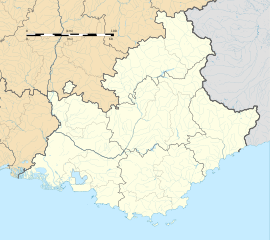
Back Marseille Afrikaans Marseille ALS ማርሴ Amharic Marsiella AN مارسيليا Arabic مارساى ARZ Marsella AST Marseille Aymara Marsel Azerbaijani مارسی AZB
Marseille
Marselha (Occitan) | |
|---|---|
Prefecture and commune | |
Skyline of the Euroméditerranée narrow streets near Fort Saint-Jean | |
| Motto(s): Actibus immensis urbs fulget massiliensis "The city of Marseille shines from its great achievements" | |
| Coordinates: 43°17′47″N 5°22′12″E / 43.2964°N 5.37°E | |
| Country | France |
| Region | Provence-Alpes-Côte d'Azur |
| Department | Bouches-du-Rhône |
| Arrondissement | Marseille |
| Canton | 12 cantons |
| Intercommunality | Aix-Marseille-Provence Metropolis |
| Subdivisions | 16 arrondissements |
| Government | |
| • Mayor (2020–2026) | Benoît Payan[1] (DVG) |
Area 1 | 240.62 km2 (92.90 sq mi) |
| • Urban (2020[2]) | 1,758.2 km2 (678.8 sq mi) |
| • Metro (2020[3]) | 3,971.8 km2 (1,533.5 sq mi) |
| Population (2022)[4] | 877,215 |
| • Rank | 2nd in France |
| • Density | 3,600/km2 (9,400/sq mi) |
| • Urban (Jan. 2021[5]) | 1,625,845 |
| • Urban density | 920/km2 (2,400/sq mi) |
| • Metro (Jan. 2021[6]) | 1,888,788 |
| • Metro density | 480/km2 (1,200/sq mi) |
| Demonym(s) | Marseillais (French) Marselhés (Occitan) Massiliot (ancient) |
| Time zone | UTC+01:00 (CET) |
| • Summer (DST) | UTC+02:00 (CEST) |
| INSEE/Postal code | 13055 /13001-13016 |
| Dialling codes | 0491 or 0496 |
| Website | marseille.fr |
| 1 French Land Register data, which excludes lakes, ponds, glaciers > 1 km2 (0.386 sq mi or 247 acres) and river estuaries. | |
Marseille or Marseilles (French: Marseille; Provençal Occitan: Marselha) is a city in southern France, the prefecture of the department of Bouches-du-Rhône and of the Provence-Alpes-Côte d'Azur region. Situated in the Provence region, it is located on the coast of the Mediterranean Sea, near the mouth of the Rhône river. Marseille is the second-most populous city in France, after Paris, with 873,076 inhabitants in 2021.[7] Marseille with its suburbs and exurbs create the Aix-Marseille-Provence Metropolis, with a population of 1,911,311 at the 2021 census.[8][6]
Founded c. 600 BC by Greek settlers from Phocaea, Marseille is the oldest city in France, as well as one of Europe's oldest continuously inhabited settlements.[9] It was known to the ancient Greeks as Massalia and to Romans as Massilia.[9][10] Marseille has been a trading port since ancient times. In particular, it experienced a considerable commercial boom during the colonial period and especially during the 19th century, becoming a prosperous industrial and trading city. Nowadays the Old Port still lies at the heart of the city, where the manufacture of Marseille soap began some six centuries ago. Overlooking the port is the Basilica of Notre-Dame-de-la-Garde or "Bonne-mère" for the people of Marseille, a Romano-Byzantine church and the symbol of the city. Inherited from this past, the Grand Port Maritime de Marseille (GPMM) and the maritime economy are major poles of regional and national activity and Marseille remains the first French port, the second Mediterranean port and the fifth European port.[11] Since its origins, Marseille's openness to the Mediterranean Sea has made it a cosmopolitan city marked by cultural and economic exchanges with Southern Europe, the Middle East, North Africa and Asia. In Europe, the city has the third largest Jewish community after London and Paris.[12]
In the 1990s, the Euroméditerranée project for economic development and urban renewal was launched. New infrastructure projects and renovations were carried out in the 2000s and 2010s: the tramway, the renovation of the Hôtel-Dieu into a luxury hotel, the expansion of the Velodrome Stadium, the CMA CGM Tower, as well as other quayside museums such as the Museum of Civilisations of Europe and the Mediterranean (MuCEM). As a result, Marseille now has the most museums in France after Paris. The city was named European Capital of Culture in 2013 and European Capital of Sport in 2017. Home of the association football club Olympique de Marseille, one of the most successful and widely supported clubs in France, Marseille has also hosted matches at the 1998 World Cup and Euro 2016. It is also home to several higher education institutions in the region, including the University of Aix-Marseille. A resident of Marseille is a Marseillais.
- ^ "Répertoire national des élus: les maires" (in French). data.gouv.fr, Plateforme ouverte des données publiques françaises. 13 September 2022.
- ^ "Comparateur de territoire - Unité urbaine 2020 de Marseille-Aix-en-Provence (00759)". INSEE. Retrieved 8 April 2022.
- ^ "Comparateur de territoire - Aire d'attraction des villes 2020 de Marseille - Aix-en-Provence (003)". INSEE. Retrieved 8 April 2022.
- ^ "Populations de référence 2022" (in French). The National Institute of Statistics and Economic Studies. 19 December 2024.
- ^ INSEE. "Statistiques locales - Marseille-Aix-en-Provence : Unité urbaine 2020 - Population municipale (historique depuis 1876)". Retrieved 12 July 2024.
- ^ a b INSEE. "Statistiques locales – Marseille – Aix-en-Provence : Aire d'attraction des villes 2020 - Population municipale (historique depuis 1876)". Retrieved 12 July 2024.
- ^ INSEE. "Statistiques locales - Marseille : Commune - Population municipale (historique depuis 1876)" (in French). Retrieved 12 July 2024.
- ^ "Statistiques locales - Métropole d'Aix-Marseille-Provence : Intercommunalité-Métropole - Population municipale (historique depuis 1876)". INSEE. Retrieved 12 July 2024.
- ^ a b Duchêne & Contrucci 1998, page needed A.
- ^ Ebel, Charles (1976). Transalpine Gaul: the emergence of a Roman province. Brill Archive. pp. 5–16. ISBN 90-04-04384-5., Chapter 2, Massilia and Rome before 390 B.C.
- ^ Notteboom, Theo (11 March 2009). "Les ports maritimes et leur arrière-pays intermodal". Concurrence entre les ports et les liaisons terrestres avec l'arrière-pays. Tables rondes FIT. pp. 27–81. doi:10.1787/9789282102299-3-fr. ISBN 9789282102268. Retrieved 30 October 2020.
- ^ Mandel, Maud S. (5 January 2014). Muslims and Jews in France. Princeton University Press. doi:10.1515/9781400848584. ISBN 978-1-4008-4858-4.










